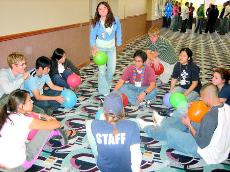Leadership programs prove to be ‘profound experience’

ActiveLEAD from Campus Recreation had facilitators that led small groups to complete different teamwork tasks. The Intersect conference on Oct. 1, 2005. Patrice Yao
March 16, 2006
When Patrice Yao, senior in Business, left on a University bus bound for Effingham, Ill., for the overnight Leadership Center I-program called Insight during her sophomore year, she had high expectations.
“I’ve always been really involved, and I wanted to get to know people,” she said. “I thought I’d give (Insight) a shot. I expected to meet a lot of people from across campus that I didn’t know from classes or the residence hall. I also wanted to meet student leaders with experiences and opinions different from my own.”
The Leadership Center seemingly surpassed Yao’s expectations. Since then, Yao has attended the four I-programs eight times, as a participant and as a student facilitator.
“I thought it was so much fun,” she said. “I met new students and staff, and saw a place on campus where they come together to pursue the common goal of leadership development. The University seems a lot more intimate, and I think the Leadership Center is a great opportunity for any student looking to get involved on campus.”
The I-programs are leadership conferences that were created by staff members of the Leadership Center as a collaborative effort among faculty, staff, alumni and students and geared toward specific skill efforts that are beneficial to students.
Get The Daily Illini in your inbox!
Each conference – Ignite, Intersect, Imprint and Insight – varies in length and location and focuses on one of the four skills of self-awareness, interpersonal development, organizational development or transitional development, said Sara Thompson, Leadership Development Coordinator for the Leadership Center.
“The conferences benefit students in a variety of ways,” Thompson said. “Students are developing leadership skills and life skills that will help them to be better in their careers, communities and families. They become aware of their strengths and weaknesses, learn how they can grow and lead in their relationships every day.”
Leadership skills shouldn’t be limited to certain people, Yao said.
“Anyone can practice leadership,” she said. “It’s really about believing in yourself and learning new ways to develop leadership skills.”
Thompson said each program serves between 60 to 200 students and is completely free, thanks to generous alumni who make donations to support the programs.
Yao said her favorite program was Ignite, a three-day, two-night conference that is offered twice each year in January and May and focuses on organizational development. During Ignite, small groups of students are given a real world problem and work together to achieve a common solution. Each team then presents its vision to the rest of the conference.
Sara Lalich, senior in Communications, said she had a “profound experience” at Imprint, which led her to apply to be a Graf intern at the Leadership Center.
“Imprint is really unique; it incorporates a number of alumni who offer themselves as mentors and leaders,” she said. “My facilitator was just amazing. She taught me you have to live your passions out. I developed so much from this program, even though it was only a day.”
And this year, as one of four Graf interns, Lalich was responsible for helping to coordinate one I-program, as well as maintaining relationships with staff, faculty, alumni and past participants so that they might come back to facilitate a program, donate their time or be a coach for the Leadership Certificate program.
In order to obtain a Leadership Certificate through the Leadership Center, which usually takes between two and four semesters, students must attend three of the four I-programs, take leadership classes chosen from all subjects on campus and work with a coach.
“The coach is a mentor who challenges and encourages the student to stay on track,” Thompson said. “They receive one-on-one mentoring; rarely do you have that anywhere else. (The Leadership Certificate program) is catered to the student’s specific needs. Throughout the process, you see how you’ve grown.”
Currently there are 74 students in the process of obtaining their leadership certificates, with 32 just completed, Thompson said.
“It’s a great accomplishment,” said Yao, who went through the process of getting her certificate. “There’s a recognition ceremony where you get your certificate of completion, and you can showcase your portfolio of all these amazing experiences focused on leadership. I really hope students take advantage of it.”
Lalich said the student and facilitator feedback from both the I-programs and the Leadership Certificate program has been “phenomenal.” Student feedback is extremely important in the coordination of each conference, Thompson said.
“We are always making improvements,” she said. “We’re revising certain portions of the curriculum for Intersect and Insight based on student feedback. We’re also adding a program on integrity.”
Lalich said she feels the I-programs are a great way for students to learn about themselves, and how they can improve in their everyday life and relationships.
“I feel like I’ve gained so much from all of (the programs), it’s inexpressible,” she said. “It’s practical, it’s self-development, and that’s what we’re missing from our academics. Self-development and awareness are not really things you learn about in a lot of classes.”






